Federal judges review Alabama’s new congressional map, lack of 2nd majority-Black district
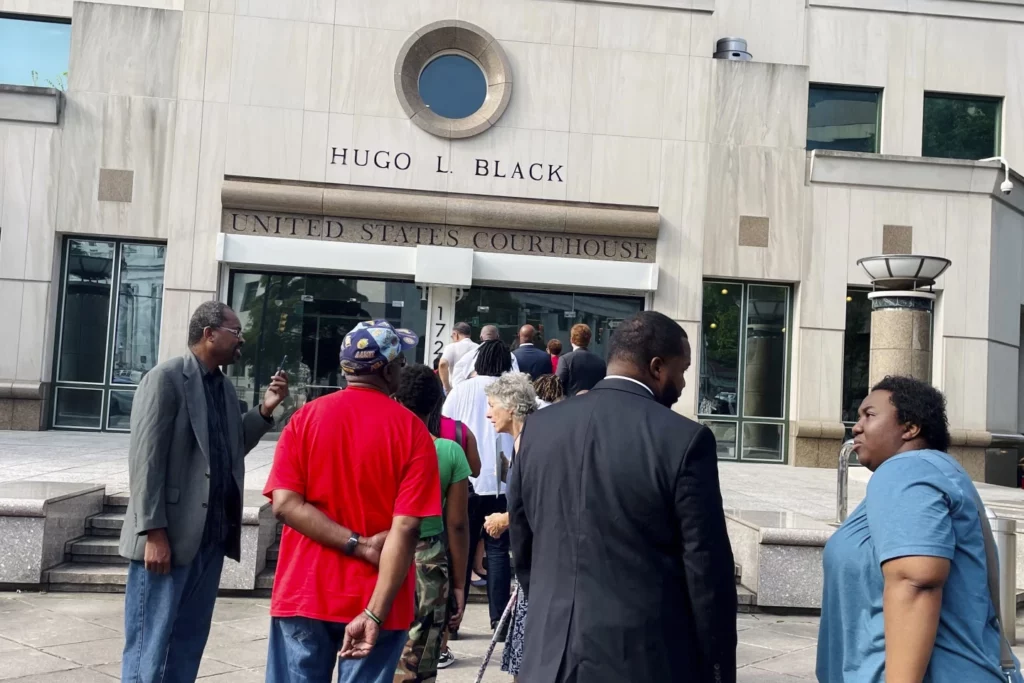
Federal judges reviewing Alabama’s new congressional map on Monday sharply questioned if state lawmakers ignored the court’s directive to create a second-majority Black district, so minority voters have a fair opportunity to influence elections. The three-judge panel held a hearing as they weigh whether to let the map stand or to step in and draw new congressional districts for the state. The panel heard arguments Monday but did not indicate when it would rule. Alabama was forced to draw new district lines after the U.S. Supreme Court, in a surprise June decision, upheld the panel’s earlier finding that the state’s then-map — which had just one Black-majority district out of seven in a state where more than one in four residents is Black — likely violated the federal Voting Rights Act. Lawyers for voters in the case argued Monday that the new plan, which maintains one majority-Black district, still discriminates against Black voters. They said it flouts the panel’s 2022 finding that Alabama should have two districts where Black voters comprise a majority or “something quite close to it.” All three judges pointedly asked the state’s lawyer whether Alabama had ignored their finding that the state should have a second district where Black voters have an opportunity to elect their preferred candidates. Judge Judge Terry F. Moorer asked if Alabama had chosen to “deliberately disregard” the court’s instruction. Judge Stan Marcus asked the state, “Were you not required to draw a new map (that provides a reasonable) opportunity (district for Black voters)?” Edmund LaCour, Alabama’s solicitor general, said the redrawn map was as “close as you get” to creating a second majority-Black district without violating the U.S. Constitution or traditional redistricting criteria. “I think it is close as you get without violating the Constitution,” LaCour said. LaCour accused the plaintiffs of seeking a “racial gerrymander” over traditional guidelines for drawing districts, such as keeping districts compact and keeping communities of interest together. Abha Khanna, an attorney representing one group of plaintiffs in the case, said Alabama chose “defiance over compliance.” “Alabama has chosen instead to thumb its nose at this court and to thumb its nose at the nation’s highest court and to thumb its nose at its own Black citizens,” Khanna said. Khanna said Alabama essentially changed nothing for Black voters by passing a map that maintained a single majority-Black district. White voters will continue to Alabama Republicans, who have been reluctant to create a Democratic-leaning district, boosted the percentage of Black voters in the majority-white 2nd Congressional District, now represented by Republican Rep. Barry Moore, from about 30% to 39.9%. State leaders are engaging in a high-stakes wager that the panel will accept their proposal or that the state will prevail in a second round of appeals to the Supreme Court which could again test the requirements of the Voting Rights Act. The panel in 2022 issued a preliminary injunction blocking the state’s then-map. During the court hearing, a judge asked the sides about next steps and whether they were starting anew in the review of the map. The high-stakes hearing drew a large number of spectators to the federal courthouse in Birmingham, where an overflow room was opened to accommodate the large crowd. Plaintiffs in the Supreme Court case attended, with many wearing T-shirts printed with their proposed map, which would have two majority-Black districts. Former U.S. Attorney General Eric Holder, chairman of the National Democratic Redistricting Committee, said in a statement that Alabama’s new map “denies Black Alabamians their lawfully protected rights.” “Alabama’s latest congressional map is a continuation of the state’s sordid history of defying court orders intended to protect the rights of Black voters,” Holder said. Republished with the permission of The Associated Press.
Kate Britt, Tommy Tuberville, John Cornyn, and colleagues introduce resolution to strike down Joe Biden’s border policies

U.S. Senators Katie Britt (R-Alabama) and Tommy Tuberville (R-Alabama) recently joined Sen. John Cornyn (R-Texas) and five colleagues in introducing a joint resolution of disapproval under the Congressional Review Act to strike down President Biden’s Circumvention of Lawful Pathways rule. The Biden Administration’s rule purports to take a hard line on illegal migration. However, the senators argue the rule is riddled with exceptions and funnels migrants into unlawful parole programs that the U.S. Department of Homeland Security (DHS) has set up without Congress’ consent to allow more migrants with weak or non-existent asylum claims to enter the United States. “As the border disaster rages on, the Biden Administration continues to unilaterally install irresponsible policies that weaken our national security and disregard the rule of law,” said Sen. Britt. “President [Joe] Biden’s Circumvention of Lawful Pathways rule is a transparent attempt to reclassify illegal migration as legal immigration so that the unprecedented numbers at the border appear better on paper than they are in reality.” “Last month, encounters at the border jumped by 30%,” Britt continued. “The Administration is clearly unserious about ending this crisis, as they are pulling 1,100 active duty personnel from the border while daily encounters continue to rise steadily. This rule is just the latest in a series of dangerous and unserious policies that allow transnational criminal organizations like the cartels to illegally traffic deadly drugs into our communities, schools, and homes. It’s time for the Administration to actually secure the border – not let more people into our country’s interior under different terminology.” “Joe Biden can’t run from his record on the border,” said Sen. Tuberville. “He single-handedly caused the worst border crisis in our history, flooding our country with some 5 million illegal border crossings and unprecedented quantities of deadly drugs. His latest rule might score political points, but it’s riddled with loopholes and won’t actually protect our country. I’m proud to join my colleagues today to stand up and stop it.” “The Biden administration’s rule is an unserious attempt at resolving the border crisis and is full of loopholes that the cartels will easily exploit to continue moving unlawful migrants into the United States and overwhelm our Border Patrol,” Sen. Cornyn said. “Rather than stop unlawful migration, President Biden is using this rule to funnel the migrants into unlawful parole programs, and this resolution would put an end to this shell game to hide an unprecedented level of illegal immigration.” Sens Britt, Tuberville, and Cornyn were joined on the resolution by Sens. Marsha Blackburn (R-Tenn.), Cynthia Lummis (R-Wyoming), Ted Budd (R-North Carolina), Steve Daines (R-Montana), and Cindy Hyde-Smith (R-Mississippi). The Biden Administration’s Circumvention of Lawful Pathways rule went into effect on the same day the Center for Disease Control and Prevention’s (CDC) Title 42 public health order expired on May 11, 2023. This rule funnels migrants into one of three “lawful” pathways, including: The Sens. claim that the first two pathways constitute an abuse of the DHS Secretary’s parole authority, which under our immigration law is only to be used on a true case-by-case basis. The Senators further claim that illegal immigrants and the transnational criminal organizations that take advantage of them will quickly learn to exploit these loopholes and overwhelm our detention facilities as Border Patrol attempts to adjudicate whether migrants fall into one of the numerous exceptions. Katie Britt is the Ranking member of the Homeland Security Subcommittee of the Senate Committee on Appropriations. To connect with the author of this story or to comment, email brandonmreporter@gmail.com.
Mid-Alabama Republican Club discusses congressional redistricting issue
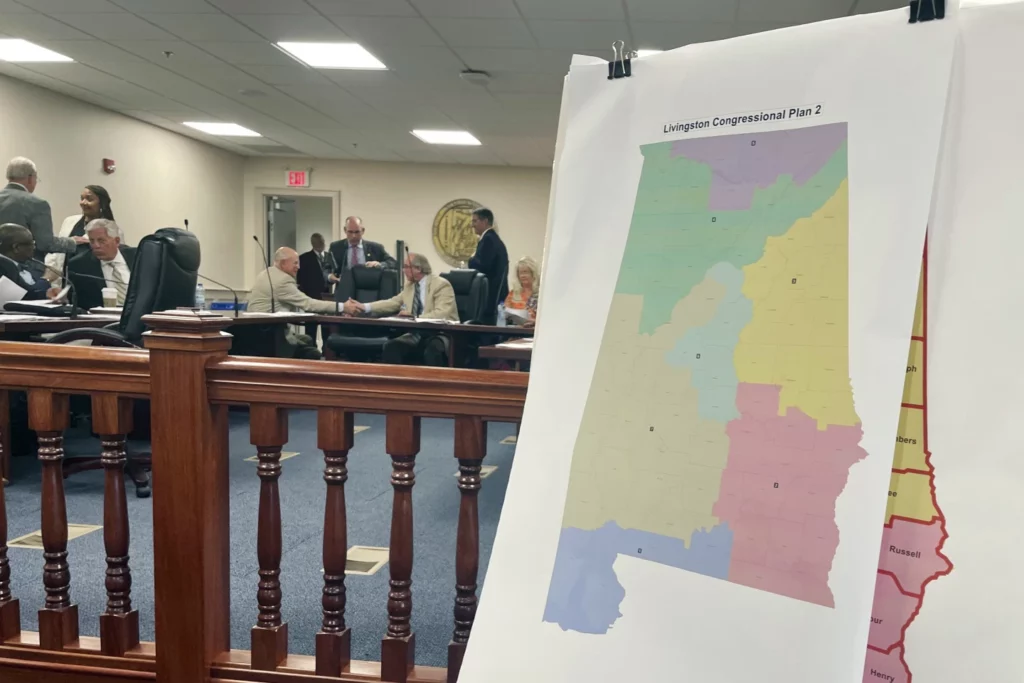
On Saturday, attorney Bert Jordan briefed the influential Mid-Alabama Republican Club (MARC) on the pending federal litigation over Alabama’s disputed congressional redistricting. On Monday morning, the State of Alabama will defend a congressional redistricting plan passed by the Alabama Legislature in July’s second 2023 special session. Plaintiffs have challenged that plan as violating Section 2 of the Voting Rights Act of 1965. Hoover City Councilman John Lyda is the President of MARC. “Burt Jordan has practiced law here for 43 years,” Lyda said. “His law firm, Wallace, Jordan, Ratliff, & Brandt, represents the City of Hoover, and I am very grateful for that.” Lyda said Jordan represented Perry Hooper Sr. in his disputed Chief Justice of the Alabama Supreme Court race in 1992. He has been counsel for the Alabama Republican party. He also served as County chairman from 1995 to 1999. Jordan criticized the media coverage, particularly that of al.com in this case, as inaccurate. “I know al.com could do a better job,” he stated. “In early 2022, a U.S. District Court consisting of three judges issued an injunction because the 2021 Congressional redistricting likely violated section 2 of the Voting Rights Act,” Jordan said. “Section 5 was struck down in 2012 in a decision by Chief Justice John Roberts. John Roberts has received a lot of criticism for that decision.” Jordan explained that in 1982, the City of Mobile’s city council districts were upheld by the Supreme Court. The city had three council districts that were voted on city-wide, but no Black representative had been elected to the council, even though the city was 33% Black. The Supreme Court found that the Mobile redistricting did not violate Section 2 because there was no intent to prevent a Black person from being elected. It just hadn’t happened. Following the Mobile decision, Section 2 of the VRA was rewritten by Congress from showing intent to a results outcome. Jordan explained 27% of Alabamians are Black. The plaintiffs argue that based on the results test, then two out of the seven congressional districts should be majority Black. “Nothing in this section establishes a right to have members of a protected class elected in numbers equal to their proportion in the population,” Jordan stated. Jordan said that a key Supreme Court decision here was Thornburg v Gingles. “The Gingles factors: First, the minority group must be sufficiently large and geographically compact to constitute a majority in a reasonably configured district. Second, the minority group must show that it is politically cohesive. Third, the minority must demonstrate that the White majority votes sufficiently as a bloc to enable it……..to defeat the minority’s preferred candidate. Finally, a plaintiff who demonstrates the three preconditions must also show, under the “totality for the circumstances,” that the political process is not “equally open” to minority voters.” Jordan said that the Court ruled that the 2021 Alabama congressional redistricting was “likely a violation of section 2 of the voting rights act. That is why we are where we are today.” Jordan explained that there are three separate lawsuits challenging the 2021 congressional redistricting that have all been wrapped together into one suit. Those plaintiffs are Milligan from Montgomery, Castor from Mobile, and state Senator Bobby Singleton from Hale County. “They say that the Legislature’s remedial plan does not comply with Section 2 of the Voting Rights Act,” Jordan said. “It comes down to the racial composition of (Congressional) District 2. The complaint of the plaintiffs is that (the remedial congressional redistricting map passed by the Legislature in July) is not going to remedy the problem.” The Legislature increased the number of Black voters in CD2 to almost 40%. Jordan said that Milligan and the other plaintiffs will argue that “the Legislature did not produce two majority Black Districts”; thus, that violates the results test of Section 2 of the VRA. “The way the state is defending this is important,” Jordan said. “The state is defending this on the grounds that it united the Black Belt and is preserving communities of interest while minimizing the number of county splits. The counterpoint is this, as seen from Terri Sewell, is that Alabama has defied the Supreme Court.” “The Supreme Court has ruled that the 2021 redistricting likely violated Section 2,” Jordan said. “There has never been a final ruling. The state is arguing that there has never been a final judgment, only a preliminary ruling, so the burden of proof is still on Milligan, Castor, and Singleton.” “We don’t know how that will play out exactly,” in the hearing on Monday, Jordan said. “There will be a lot of legal discussion between the judges and the attorneys.” Jordan said that the VRA had been misused at times in the past for gerrymandering. “One of the ways that it was misused was in drawing bizarrely shaped districts such as North Carolina District 12 (in 1990),” Jordan said. That redistricting snaked through multiple counties in North Carolina, connecting communities of color into a majority Black district. One consequence is that it made it easier for Republicans to win the neighboring districts. The Supreme Court rejected the gerrymandered District 12, Jordan explained. Jordan said that that decision was then used as a precedent in a 1990s case that he and Ferris Stephens brought challenging what was then Alabama state board of education district 4, where Jefferson County was in a school district with just the Black neighborhood of Tuscaloosa connected by a narrow lasso. The Court overturned the school board redistricting because it violated the North Carolina District 12 decision. Jordan said that Singleton has presented a map to the Court where Jefferson County is kept as a whole but is connected with Bibb to Hale and Perry Counties in the Blackbelt. Jordan said that this is dilution and thus would not pass legal scrutiny. Jordan said that the Court has declined to eliminate partisan gerrymandering. “The Supreme Court ruled in 2019 that it couldn’t resolve partisan gerrymandering because it can’t make the decision on what is too much and what is fair,” Jordan said. “There is a lot of elite thinking that partisanship is distasteful. It may be, but it may be the best thing that
PowerSouth and Optiwatt enter partnership to ensure EVs don’t stress power grid during peak demand
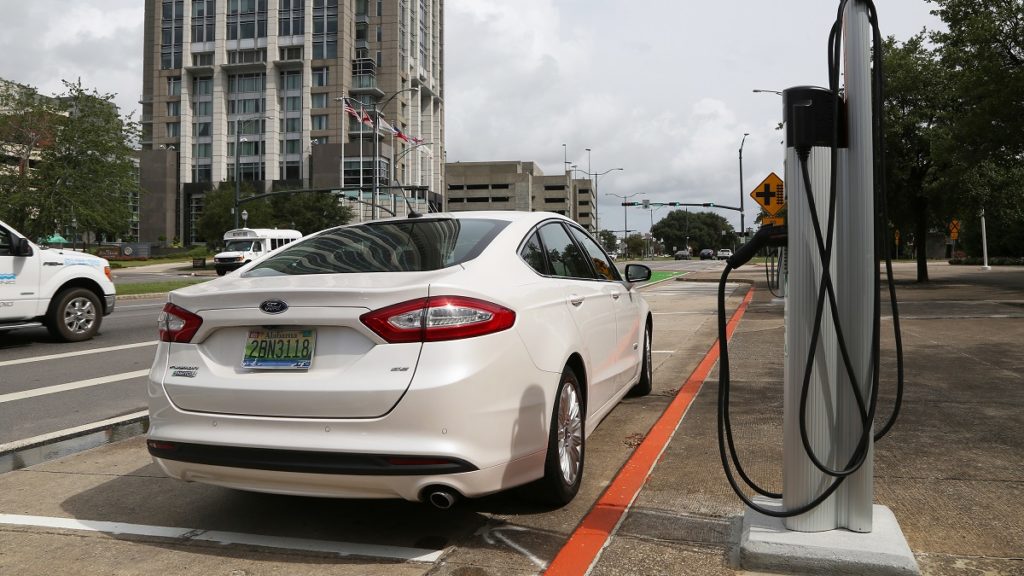
In a not-so-distant future, in an Alabama town, a Mom picks up her kids from ball practice. They get snacks from the refrigerator and turn on their computers to do homework while watching TV and charging their phones at the charging station. Mom plugs in her new electric vehicle (EV) to charge, then turns on the electric skillet, the microwave, and the oven to prepare dinner while listening to satellite radio and drying a load of clothes in the electric clothes dryer. She then hooks up the robot vacuum to its charger after its deployment in the den. It is 98 degrees in an Alabama summer, so the air conditioning is going full tilt, and the sprinklers are keeping the lawn watered. Dad comes in and plugs in his EV to charge before he puts his smartphone on the charger and turns on the Smart TV and his favorite playlist while he catches up on the day’s news. This is repeated a thousand times in this idyllic future Alabama town. This all sounds wonderful, but electric grid planners see a problem here – and that is the number of kilowatts being pulled by thousands of EVs getting plugged in at the same time right during peak power demand. Seeing where this could lead to problems for the grid, PowerSouth Electric Cooperative has announced a partnership with EV charging platform Optiwatt that allows electric vehicle owners in participating areas of Alabama and Florida to receive $25 compensation to register for the PowerSouth Managed Charging Pilot. The partnership between Optiwatt and PowerSouth is a pilot program aimed at preparing U.S. electricity grids for increasing EV adoption, which will grow exponentially in the next few years and put local utility providers under stress due to heightened charging demand. Managed charging automates EV charging to prevent excess electricity usage during those peak demand times. This, in turn, reduces the cost of electricity and lessens CO2 emissions and the risk of grid blackout for utility providers. The Electric Vehicle Research Pilot will analyze EV charging trends to prepare the South’s electricity infrastructure for the expected load from electric vehicle charging. Optiwatt is the largest telematics-based managed charging platform in North America. Their partnership with PowerSouth Energy Cooperative will help plan for increased energy demand as more electric vehicles (EVs) hit the road in the Southeast as the Biden Administration is demanding that Americans adopt EVs. Mike Majors is the Member Services Coordinator of PowerSouth “Our service territory has seen growth in EV use, particularly in pockets of coastal Florida and Alabama,” said Majors. “For EVs to be sustainable long term, we must position the grid to support increased electrification and new charging habits. This is what the Optiwatt partnership seeks to address.” Optiwatt and 14 of PowerSouth’s distribution member systems are inviting EV owners in its service area across southern Alabama and northwest Florida to participate in the Electric Vehicle Research Pilot. Users can receive a one-time $10 incentive for signing up and a $15 incentive at the program’s conclusion. Enrollment will end once the program reaches a maximum of 250 vehicles, and the program is currently halfway subscribed after its first week. Participation will not affect vehicle charging in any way. The Biden Administration has ordered vehicle manufacturers to target net-zero emissions in passenger vehicles before 2050. Meanwhile, the Environmental Protection Agency (EPA) is considering requiring that 67% of new passenger vehicles be electric by 2032 and has proposed targeting the coal, natural gas, and oil-powered power plants that produce most of America’s electricity. United States electric providers are scrambling to deal with these future realities. The increase in EV adoption will result in increased stress on the grid. This research pilot will help PowerSouth evaluate the potential impacts of EVs on the grid. The program supports most electric vehicles today, although plug-in hybrids are excluded. Upon enrollment, vehicles will be assigned to a research group to measure the impact of EV charging on grid load optimization. The pilot program began on July 31, 2023, with the City of Elba, as well as CHELCO, Clarke Washington, Coosa Valley, Covington, Dixie, Escambia River, Gulf Coast, Pioneer, South Alabama, Southern Pine, Tallapoosa River, West Florida and Wiregrass Electric Cooperatives participating. The program will end on January 31, 2024, with the objective of continuing as a permanent area of service. To enroll, participants must download the free Optiwatt app on the App Store or Google Play or use a web browser and follow the program instructions. Optiwatt is headquartered in San Francisco, California. It is the largest telematics-based home energy analytics platform in North America. The company’s partnerships with national utility providers and production consumer-facing applications reduce cost and energy usage for home and auto owners. To connect with the author of this story or to comment, email brandonmreporter@gmail.com.
Katie Britt, Tim Scott, and colleagues lead a bicameral amicus brief challenging the CFPB’s funding structure
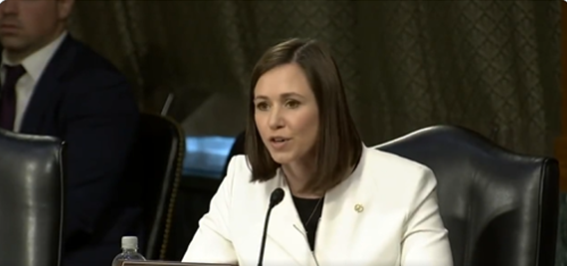
U.S. Senator Katie Britt recently joined Ranking Member Tim Scott (R-S.C.) of the Senate Committee on Banking, Housing, and Urban Affairs, Chairman Patrick McHenry (R-North Carolina) of the House Financial Services Committee, Representative Andy Barr (R-Kentucky), the Chairman of the Subcommittee on Financial Institutions and Monetary Policy, Representative Bill Huizenga (R-Michigan), the Chairman of the Subcommittee on Oversight and Investigations, and a bicameral group of 132 members of Congress in filing an amicus curiae brief to the Supreme Court in Consumer Financial Protection Bureau, et al., v. Community Financial Services Association of America, Limited, et al. U.S. Senator Tommy Tuberville (R-Alabama) has also joined the amicus brief. The brief urges the Supreme Court to uphold the Fifth Circuit’s decision that the Consumer Financial Protection Bureau’s (CFPB) funding structure is unconstitutional and to make the Bureau’s funding subject to congressional appropriations like most of the federal government. “The Constitution clearly grants Congress power over the appropriations process. The CFPB should be no exception but has been operating outside of this lawful process with little oversight or taxpayer accountability,” said Senator Britt. “This amicus brief reaffirms the importance of spending public funds as directed by Congress and ‘not according to the individual favor of Government agents.’ The current funding scheme utilized by the CFPB is unsustainable and unconstitutional, and I urge the Court to uphold the Fifth Circuit’s decision.” “Thankfully, our government has a system of checks and balances, one of which includes congressional oversight and the power of the purse—appropriations,” Sen. Scott said. “In these important and trusted roles, we analyze and scrutinize the executive branch’s actions on behalf of the American taxpayer, so that the voices of the country’s citizens are heard and their viewpoints reflected. Unfortunately, the Consumer Financial Protection Bureau—or the CFPB—is a notable exception. It is not accountable to Congress or the American taxpayer through the appropriations process, and it routinely and brazenly acts outside of the scope of its authority.” The brief states, “The Court need not determine which particular aspect of the CFPB’s funding scheme is the most problematic. This is the easy case. The CFPB ‘is in an entirely different league’ from other entities when it comes to its insulation from Congress… to the point that the CFPB currently operates as ‘a sort of junior-varsity Congress’ setting its own funding levels in perpetuity… Such insulation means that Congress itself is not determining the CFPB’s funding. The Court should affirm the judgment below, which will return the matter of the CFPB’s funding to the normal political and legislative channels, as Article I and the Appropriations Clause require.” Questions about the constitutionality of the CPFB have followed the agency since its founding in the early years of the Obama Presidency. Then U.S. Sen. Richard Shelby (R-Alabama) said. “For years, I have argued that supporters of Dodd-Frank sacrificed our Constitution in the name of bureaucratic independence,” Shelby stated. “While the court’s ruling today is a victory for accountability, it is meaningless without a President who is willing to rein in the unmatched authority of the CFPB’s Director.” Conservatives are optimistic that the Court will rule to place the troubled agency under congressional oversight through the budgeting process. Katie Britt was elected to the U.S. Senate in 2022. To connect with the author of this story or to comment, email brandonmreporter@gmail.com.
Federal court hearing on redistricting case set for today
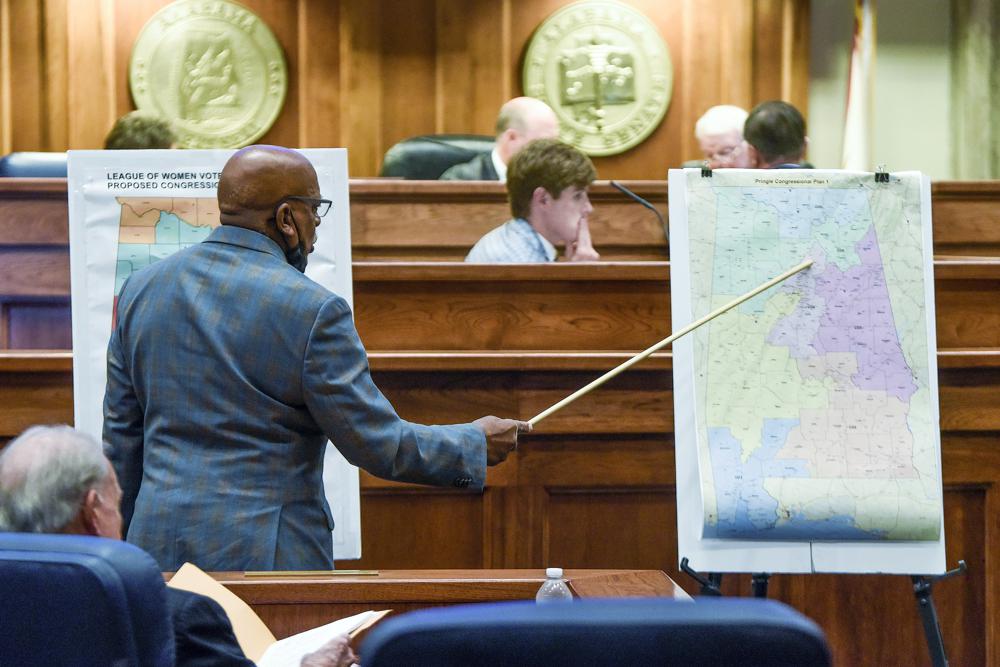
The entire political world in Alabama will be watching Monday to see what the court does with Alabama’s disputed redistricting case. A hearing is scheduled for Monday, August 14, in federal court at 9:00 a.m. CDT at the Hugo L. Black United States Courthouse in Birmingham. The hearing will focus on whether the map recently passed by the Alabama State Legislature complies with section two of the Voting Rights Act of 1965. Civil rights groups sued the state challenging the redistricting map that the Legislature passed in 2021. A three-judge panel of the Eleventh Circuit Court of Appeals in Atlanta ordered a halt to the 2022 election over concerns the map violated the 58-year-old Voting Rights Act. The U.S. Supreme Court intervened at the request of the state and allowed the election to proceed with the 2021 map. In June, the Supreme Court ruled in a 5 to 4 ruling that the congressional map likely violated the VRA and referred the case back to the three-judge panel. The Legislature was given until July 21 to submit a new map. The parties that sued the state and Alabama Democrats had wanted the Legislature to submit a map with two majority-minority districts. The Legislature, voting along party lines, refused and instead introduced and passed a controversial new map that simply increased Alabama’s Second Congressional District from 30% Black to 39.9%. That map kept the Gulf Coast, the Wiregrass, and Montgomery County whole; but was denounced by Democrats. The civil rights groups suing the state in federal court in Allen versus Milligan are asking the court to reject this new map. Members of the Alabama House Democratic Caucus, including House Minority Leader Anthony Daniels (D-Huntsville), will be outside the courtroom on Monday to issue their response following the conclusion of Monday’s hearing. Joining Daniels will be Caucus Chair Barbara Drummond (Mobile), Caucus Policy Chair Adline Clarke (Mobile), Caucus Secretary/ Treasurer Kelvin Lawrence (Hayneville), Rep. Patrice McClammy (Montgomery), Rep. Phillip Ensler (Montgomery), Rep. Chris England (Tuscaloosa), Rep. Patrick Sellers (Birmingham), Rep. Rolanda Hollis (Birmingham), Rep. Curtis Travis (Tuscaloosa), Rep. Napoleon Bracy (Mobile), Rep. Tashina Morris (Montgomery), Rep. A.J. McCampbell (Demopolis), and Rep. Sam Jones (Mobile) to comment on the court proceeding. “As we gather for the August 14th federal court hearing in Birmingham, Alabama, surrounded by the hallowed sites of the Civil Rights movement, we are reminded that this moment is inseparable from that struggle,” Daniels said. “We hope and pray that this court hearing, this next step, is a step forward on a continued path towards fair representation for all.” The Alabama House Democratic Caucus endorsed a redistricting plan, proposed by the Milligan and Caster plaintiffs, that would have created two majority Black congressional districts while respecting traditional redistricting guidelines. That map was rejected by the Republican supermajority and largely excluded from consideration during the legislative process. The major party primaries are on March 5, with candidate qualifying opening on October 16, so knowing where the congressional district lines are for that pending election is of some importance. To connect with the author of this story or to comment, email brandonmreporter@gmail.com.

